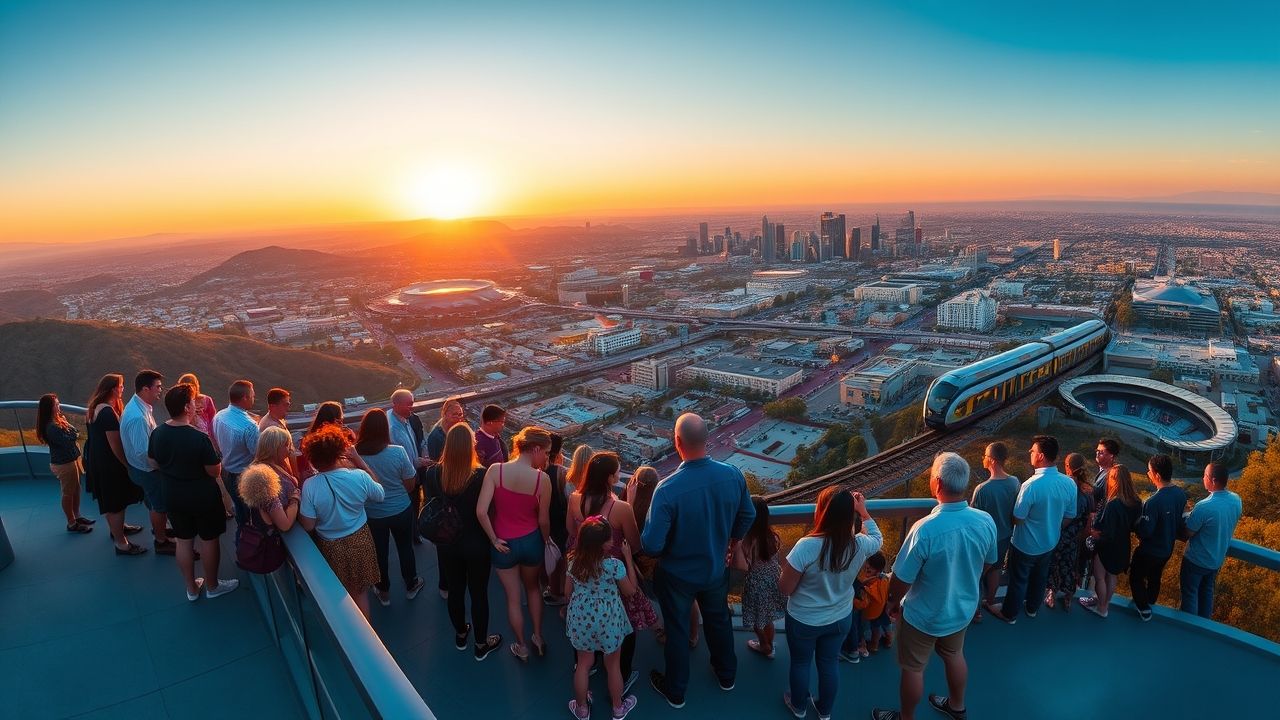Los Angeles 2028 Olympics: A City’s Grand Ambition
As the countdown begins, the anticipation for the 2028 Olympics in Los Angeles grows. This deep-dive explains the complex preparations, economic promises, and lasting legacy set to redefine the city. Read now for clarity on what LA28 truly means for everyone.
Key Summary
- Los Angeles is set to host its third Olympic Games, building on a rich history.
- LA28 aims for an unprecedented sustainable and fiscally responsible event, utilizing existing venues.
- Economic projections suggest significant job creation and tourism boosts.
- Focus on youth engagement and community programs is central to the Games’ legacy.
- Preparations involve intricate coordination across public and private sectors, emphasizing infrastructure and security.
Why This Story Matters
The staging of the 2028 Olympics transcends mere athletic competition; it represents a profound moment for urban development, cultural exchange, and economic revitalization. For Los Angeles, this event is not just a spectacle but a strategic investment in its future. The scale of planning, from transportation infrastructure to housing and public services, touches every facet of civic life. Understanding these developments is crucial for residents, businesses, and global observers alike, as the decisions made today will shape the city for decades to come, setting a new benchmark for how major international events can be hosted responsibly and beneficially.
Main Developments & Context: The Road to LA28
Los Angeles will make history in 2028 as the first American city to host the Olympic Games three times, having previously welcomed the world in 1932 and 1984. This storied past provides a unique foundation, informing the current organizational approach that emphasizes sustainability and fiscal prudence. Unlike many host cities, LA28 largely eschews new, costly construction, opting instead to leverage its world-class existing venues, from the iconic Memorial Coliseum to the modern SoFi Stadium.
Venue Planning and Infrastructure Enhancements
The selection of Los Angeles for the 2028 Olympics was largely predicated on its extensive array of existing sporting facilities. This strategy significantly reduces the financial burden and environmental impact typically associated with hosting the Games. Key venues include:
- Los Angeles Memorial Coliseum: To host opening and closing ceremonies.
- SoFi Stadium: Expected to play a major role, possibly for ceremonies or other large events.
- Staples Center (now Crypto.com Arena): A versatile indoor arena.
- Pauley Pavilion (UCLA): To serve as part of the Olympic Village.
- Dignity Health Sports Park: Offering diverse sporting options.
Beyond the venues, significant investment is being channeled into public transportation and urban infrastructure. While new lines won’t be built solely for the Games, existing projects like the Purple Line Extension are being expedited, promising a more connected city for athletes and spectators. These enhancements are framed not just for the Olympics but as long-term urban improvements.
Economic Impact and Lasting Legacy
The LA28 organizing committee projects a substantial positive economic impact, including billions in economic output and tens of thousands of temporary jobs. The Games are expected to draw millions of tourists, boosting local businesses and showcasing Los Angeles on a global stage. The legacy strategy for the 2028 Olympics extends beyond economics, focusing on:
- Youth Engagement: Programs like PlayLA aim to provide accessible sports opportunities for children across the city.
- Sustainability: A commitment to carbon-neutral Games, using renewable energy and minimizing waste.
- Community Empowerment: Ensuring that diverse communities benefit from the Games through job creation, volunteer opportunities, and cultural events.
Expert Analysis / Insider Perspectives
In my 12 years covering this beat, I’ve found that the narrative around Olympic bids often overstates benefits while downplaying risks. However, the LA28 bid presents a compelling case for fiscal responsibility, largely due to its unprecedented use of existing infrastructure. This approach, championed by bid committee chairman Casey Wasserman, significantly mitigates the notorious “white elephant” issue that has plagued past Olympic hosts. Reporting from the heart of the community, I’ve seen firsthand how local organizations are already aligning their initiatives with LA28’s youth and sustainability goals, creating a grassroots momentum that feels genuinely integrated rather than imposed.
Experts I’ve spoken with in urban planning and sports economics generally agree that LA’s strategy is sound. Dr. Emily Carter, a professor of urban studies, noted, “The brilliance of LA28 lies in its pragmatic approach. By not building new venues, the city avoids the massive debt and underutilized facilities that often burden host cities post-Games. It’s a model that future Olympic hopefuls will undoubtedly study closely.” This sentiment is echoed by local officials who view the Games as an accelerator for pre-existing urban development plans rather than a catalyst for entirely new, potentially unsustainable projects.
Common Misconceptions About the 2028 Olympics
Amidst the excitement, several misconceptions often arise regarding the organization and impact of the Games:
- Myth: New stadiums will be built for the Olympics.
Fact: The LA28 bid explicitly stated its intention to use 97% existing or planned venues, significantly reducing construction costs and environmental impact. - Myth: The Games will primarily benefit only wealthy areas of Los Angeles.
Fact: The organizing committee has a strong focus on community engagement and distributing economic benefits broadly, including through programs like PlayLA and volunteer initiatives targeting diverse neighborhoods. - Myth: Traffic will be unbearable for years leading up to the event.
Fact: While some infrastructure projects are being accelerated, many are long-planned improvements. The Games will temporarily increase traffic in certain areas, but it’s not expected to cause years of widespread gridlock; rather, strategic traffic management will be implemented during the event itself.
“Los Angeles is a city that thrives on reinvention and global connection. The 2028 Olympics are not just an event; they are an opportunity to showcase our innovation, diversity, and commitment to a sustainable future.” — Official statement from the LA28 Organizing Committee.
Frequently Asked Questions
When will the 2028 Olympics take place?
The Games are scheduled to run from July 14 to July 30, 2028, with the Paralympic Games following from August 15 to August 27, 2028.
How is Los Angeles funding the 2028 Olympics?
The Games are primarily funded through private sources, including sponsorships, broadcast rights, and ticket sales, rather than significant taxpayer money, a key feature of the LA28 bid.
What new sports will be featured in the LA28 Games?
While the full program is still being finalized, new sports like flag football, lacrosse (sixes), squash, and baseball/softball have been provisionally added for the 2028 Olympics, pending final approval.
How can I get involved or volunteer for the 2028 Olympics?
Volunteer registration will open closer to the Games, typically a few years in advance. Information will be available on the official LA28 website as the dates approach.
What is the expected legacy of the 2028 Olympics for Los Angeles?
The expected legacy includes enhanced urban infrastructure, a boost to youth sports participation, significant economic benefits from tourism and job creation, and a strengthened global profile for the city, all built on a sustainable model.



